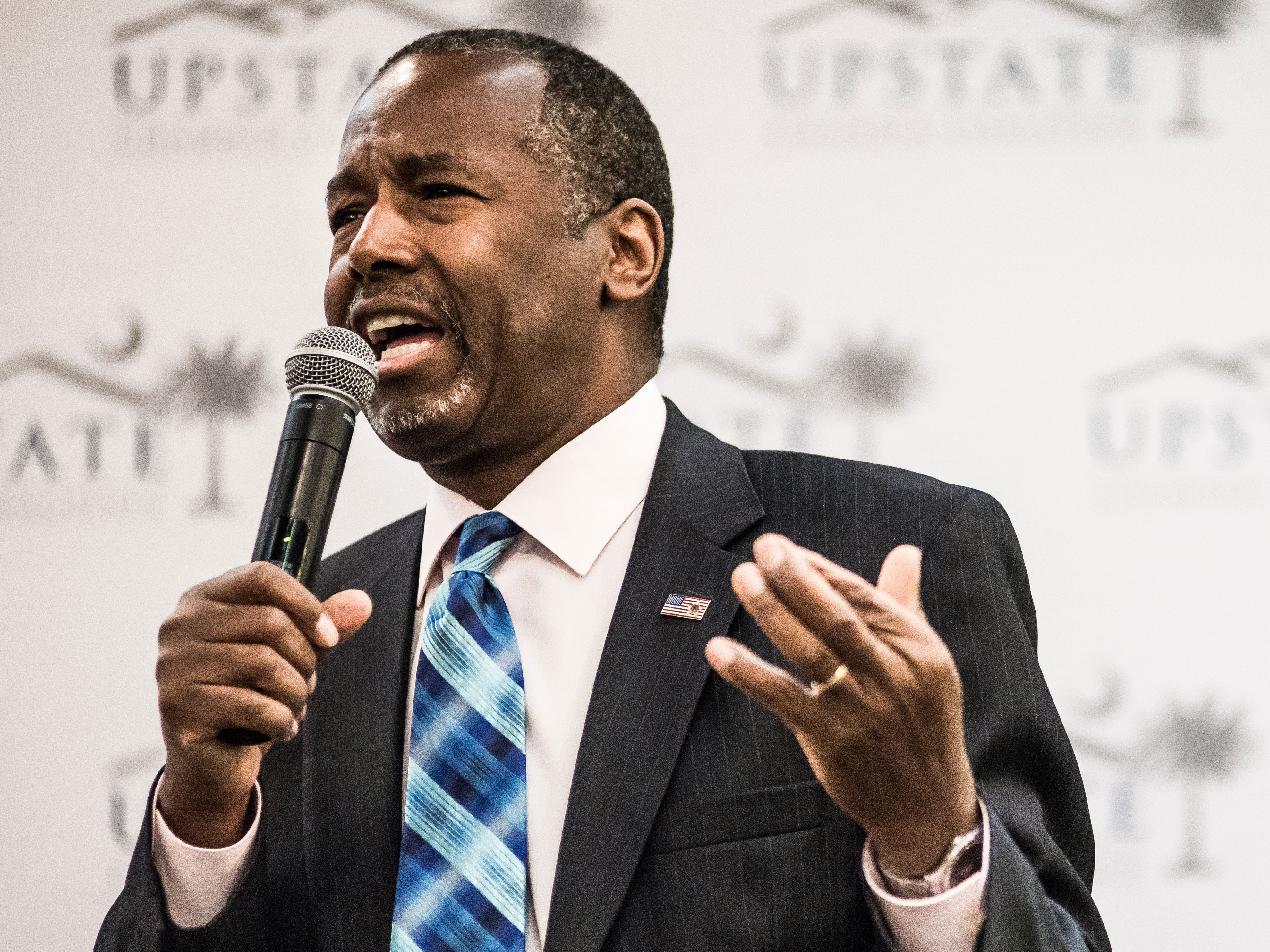Ben Carson stands by his opposition to a Muslim president, despite backlash
The Muslim president Carson said he wouldn’t support might be imaginary - but the history of religious tests for public officials is very real

On 20 September, Republican presidential candidate Ben Carson said he would not support a Muslim president.
It was only a matter of hours before others were clamoring to say that they would not support a presidential candidate who wouldn’t support a Muslim president.
Sen. Lindsey O. Graham (R-S.C.) said that Carson should apologize to American Muslims. Ted Cruz reminded Carson that “the Constitution specifies there shall be no religious test for public office.” John Kasich said the most important qualifications to be president were unrelated to religion. Bernie Sanders was “disappointed” in Carson’s statement and Keith Ellison, the country’s first Muslim member of congress, issued a statement condemning Carson and Donald Trump, whose past comments about Islam prompted Carson’s anti-Muslim-president assertion in the first place.
Republican candidates in the latest debate
Show all 15
“For Ben Carson, Donald Trump, or any other Republican politician to suggest that someone of any faith is unfit for office is out of touch with who we are as a people,” he wrote. “It’s unimaginable that the leading GOP presidential candidates are resorting to fear mongering to benefit their campaigns, and every American should be disturbed that these national figures are engaging in and tolerating blatant acts of religious bigotry.”
Meanwhile, the Council on American-Islamic Relations called on Carson to withdraw from the race.
“It’s beyond the pale,” CAIR spokesman Ibrahim Hooper told NBC.
But for the most part, Carson is standing by his comments. When asked by NBC’s Chuck Todd whether he thought Islam is consistent with the Constitution, he responded: “No, I don’t. I do not. I would not advocate that we put a Muslim in charge of this nation. I absolutely would not agree with that.”
A campaign spokesman told NBC on Sunday that Carson will be reaching out to the Muslim community but maintained that there’s a “huge gulf between the faith and practice of the Muslim faith, and our Constitution and American values.”
He’s hardly the first person to say so, about Muslims or any other religion. Despite the fact that religious tests for public officials are outlawed by the Constitution (Article VI: “no religious test shall ever be required as a qualification to any office or public trust under the United States”), there’s a long and fairly ugly history of declarations that certain faiths should disqualify people from public office.
When drafting constitutions in the 18th and 19th century, several states saw fit to include a requirement that office holders declare belief in God or a “supreme being.” It wasn’t until 1997, when considering an atheist notary public’s right to keep his job, that the Supreme Court ruled such requirements unconstitutional. Plenty of presidential candidates were accused of atheism, including some of the most revered — Thomas Jefferson and Abraham Lincoln.
And although, so far, the prospect of a Muslim candidate for president is purely hypothetical (absent the conspiracy theories about our current president), there are many real candidates who faced claims that their religion was incompatible with American values.
The first and arguably the most viciously attacked was Al Smith, four-time New York governor and the Democratic nominee in 1928. Smith’s Catholicism became the target of a vitriolic campaign against him. Fliers warned voters that Smith, if elected, would annul Protestants’ marriages and confiscate their Bibles, Smith biographer Robert Slayton wrote in the New York Times in 2012, and opponents claimed that a photo of the newly built Holland Tunnel, which links Manhattan and New Jersey, was actually a secret passageway between Washington and Rome. An anti-Smith political cartoon showed the pope and several bishops seated at a table while Smith, wearing a bellboy’s uniform, waited on them. The cartoon was captioned: “Cabinet Meeting — If Al Were President.”
Even respected intellectuals questioned whether a Catholic could be trusted to be loyal to the county. In a letter published in the Atlantic Monthly, lawyer and religion scholar Charles Marshall detailed the “inevitable and irreconcilable” conflict between Catholic teachings and the Constitution, and demanded that Smith promise not to put his allegiance to the pope above his allegiance to the country.
Partly due to anti-Catholic sentiment, Smith was defeated in a landslide by Republican candidate Herbert Hoover, who wound up with a not-so-great record as president.
Those same concerns came up about John F. Kennedy during the 1960 election. Radio evangelist G.E. Lowman warned that a Catholic president would be “in the position of cooperating fully with the Pope, taking advice from the Pope, accepting the counseling of the pope and giving the Roman Catholic Church and its teachings preeminence over the Constitution of the United States!” But three decades after Smith’s loss, those arguments seemed to have less sticking power. Kennedy became the country’s first — and, so far, only — vocally non-Protestant president.
But suspicion of candidates’ religions didn’t go away. Lest we forget the not-so-distant past, remember that Mitt Romney’s Mormonism was regarded with suspicion during his 2008 and 2012 campaigns. A Pew poll in 2007 had found that a quarter of Americans were less likely to support a candidate who was Mormon. Four years later, a South Carolina voter told NPR she could not elect Romney because Mormonism “is not a biblical-based, Judeo-Christian religion. It’s a cult.”
The Muslim president Carson said he wouldn’t support might be imaginary. But the history of religious tests for public officials is very real.
Copyright: Washington Post
Subscribe to Independent Premium to bookmark this article
Want to bookmark your favourite articles and stories to read or reference later? Start your Independent Premium subscription today.

Join our commenting forum
Join thought-provoking conversations, follow other Independent readers and see their replies